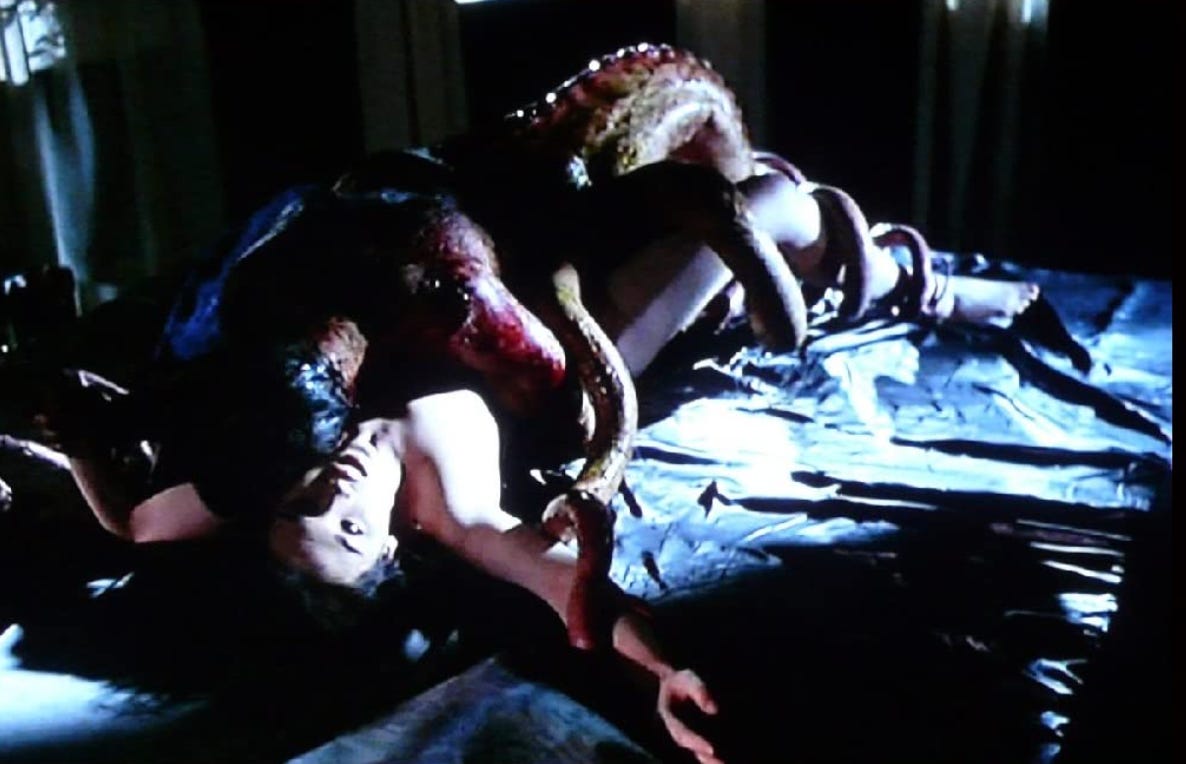"The Power of Weakness" and its Cinematic Deconstructions, by Adam Lehrer
In this excerpt from a recent Numéro Berlin essay of his, Adam Lehrer deconstructs "strength of weakness" through works by Haneke, Von Trier, Verhoeven, and Ferrara
Human History would be nothing but a record of stupidity save for the cunning contributions of the weak – Friedrich Nietzsche
Of the 436 representatives serving terms in the United States Congress, only one — DSA’s beloved Alexandria Ocasio-Cortez — recounted the January 6 “insurrectionary” riots that flooded into the halls of the United States Capitol building as if it was a nightmare.
“I hear these huge violent bangs on my door and then every door going into my office. . . like someone was trying to break the door down,” said AOC. As if this account didn’t already seem a touch exaggerated, AOC compounded her statement by saying that, “It was like a zombie movie.” That’s right: a zombie movie.
It didn’t take long for the Internet to find out that AOC was never even close to the building in which the insurrectionists stormed, nor was the so-called “scary man” who stormed her office one of those insurrectionists. He was, on the contrary, a Capitol Police officer that entered the congresswoman’s office to make sure that she was safe. In a brilliant display of diversion and emotional manipulation, AOC recounted a traumatic abuse from her past. “When we go through traumas, traumas compound on each other.” In a more recent interview, AOC claimed that she wasn’t just afraid of being killed, but of being raped as well.
It’s not my place to question the authenticity of AOC’s “trauma.” But I can question her politics, and the dubious statements that appear to reinforce those politics. The fact that AOC has shielded herself in histrionic reports of the Capitol insurrection, painful personal memories, and accusations of her colleagues attempting to murder her (yes, she accused Ted Cruz of trying to murder her) briefly following her failure to pass a bare minimum loyalty test to “the left” – in December, some members of the American left media class were asking that AOC and other “left” Democrats force a vote on Medicare for All by threatening to withhold their votes for Nancy Pelosi as Speaker of the House, and AOC and her allies ignored their supporters’ calls and voted for Pelosi without making policy demands – should surprise no one. In the collapsing bourgeois state of the United States, feigned weakness is a powerful political weapon. Politicians wield the power of the state while simultaneously claiming to be powerless, traumatized, and in need of our sympathy.
This dynamic — the obscuration of political and economic power with trauma and weakness — similarly dominates art and culture. It allows artists to marketize their identity signifiers and use them as weapons in the quest for cultural capital. As a result, art barely signifies more than its creator’s quest for visibility in the cultural marketplace. There is no complexity. No philosophy. No beauty. I want art that reflects the innate power of its creators and its subjects. I want art that explores a refusal to be victimized and a rejection of commodified trauma. Don’t you?
It shouldn’t be surprising then that since the early 1980s – that is, since the rise of neoliberalism as the hegemonic political order – some of the most provocative and sublime works of art, and of cinema in particular, have been films that transgressed and deconstructed the “strength of weakness” paradigm. Andrzej Zulawski’s Possession (1981), Abel Ferrara’s Ms .45 (1981), Michael Haneke’s The Piano Teacher (2001), Lars Von Trier’s Nymphomaniac (2013) and Paul Verhoeven’s Elle (2016) are all films that present female protagonists that would be all too easy to place into the role of the victim. These films refuse to concede to the belief that victimization is something that should be lauded, or that weakness is innately imbued with a moral character. Femininity, the state of being most often fetishized for its perceived weakness or vulnerability, is instead a state of primal will-to-power in these films. Wokeness, the ideological orientation most attached to the fetishization of weakness, is a modern iteration of bourgeois morality. Bourgeois morality in all its political forms has stifled art of its radical potential since the beginning of modernism. All artists should oppose it. These films do.
Possession
In Possession, Isabelle Adjani created one of the most powerful depictions of ferocious and primal libidinal female desire in cinematic history. The film, like so many troubling masterworks, has been the subject of accusations of misogyny since its release. And from the insufferably moralizing viewpoints of certain second wave feminists, it most definitely is. During its production, Zulawski was going through a horrendous divorce, and the film is his expression of man’s primal misogynistic rage. If art is meant to express alienation, why should any artist be vilified for expressing that alienation in whatever permutational form it might take?
Beyond that, Zulawski brutally exposes the cowardice of men, and man’s inability to comprehend or grapple with the seismic forces of female sexuality. An inferior artist would have shown scenes of Adjani’s character and her husband, played by Sam Neil, going through the motions as she chastises him for his excessive work schedule and his failures as a husband. Instead, Adjani’s character evades victimization and loses herself in the throes of sexual furor without apology and without regret, emphasizing her plunge into sexual madness with jarring body movements and bug-eyed facial gestures (Adjani’s acting here is every bit as much a work of performance art as it is a piece of screen acting). The tentacled beast that she is revealed to be having an affair with is the projection of her libidinal chaos’s embodiment, and the revelation of it causes the husband to self-destruct. He simply can’t wrap his head around the magnitude and abject nature of her desire. “There's a parallel interpretation to Żuławski's misogyny,” writes fellow Polish citizen and cultural critic Agata Pyzik on Possession. “In which women are actually empowered and are given the courage to act out their deepest fantasies.” Zulawski’s implicit contempt for women isn’t rooted in his perceptions of female weakness, Possession suggests, but in his acknowledgement of a nearly limitless and innately unknowable female strength. This is the film’s most enduring provocation.
Ms. 45
Ferrara’s Ms .45 is clearly indebted to both gritty New York tales of revenge – from Scorsese’s Taxi Driver to the Charles Bronson-starring Death Wish franchise – and the rape revenge genre that was then in its ascendancy, following the releases of films like Meir Zarchi’s I Spit On Your Grave (1978) and Bo Arne Vibenius’ Thriller–A Cruel Picture (1973). But the film’s durable intrigue lies in its destabilization of these two genres; it brings the tropes of both of them together, yielding its own specific critical subtext in the process. The film follows a mute seamstress named Thana, played by Zoë Tamerlis Lund (a fascinating figure of underground cinema, Tamerlis Lund would go onto write the screenplay for Ferrara’s masterpiece Bad Lieutenant, and was a lifelong heroin enthusiast who wasn’t just open about her use but advocated for it as a health serum, before overdosing on in 1994), who is brutally raped, TWICE, after leaving work late one night. The film then follows a fairly conventional rape revenge narrative when she bludgeons and kills the second assailant. But from there, things get strange, more violent, and more uncomfortable. After she kills another would-be attacker, Thana’s violence becomes more unhinged and more difficult to identify with and justify in the viewer’s mind. Similarly to DeNiro’s rendering of Travis Bickle, Tamerlis Lund’s performance of Thana’s revenge fantasies isn’t purely the depiction of a logical response to external stimuli, but also indicates a violent sexual pathology. Not only does Thana subvert the victimized woman trope of most rape revenge fantasia, Ferrara emphasizes that Thana is every bit as capable of wielding power, domination, and violence as her aggressors. “By the time that Ms .45 arrives at its bloodbath finale, the gendered rules of engagement have become hopelessly obscured,” writes film critic Nick Pinkerton.
Nymphomaniac
In Nymphomaniac, the final entry in Lars Von Trier’s “Depression Trilogy,” Joe (played by Charlotte Gainsbourg as an adult, and by Stacey Martin as a young woman) is consistently told by other characters that she’s weak, that she’s sick, and/or that her sexual addiction is the result of repressed trauma or pain. She negates it all, loudly. In a sex addicts anonymous meeting halfway through the film, she rejects the group’s counselor’s labeling of her as a “sex addict”: “I am not a sex addict, I am a nymphomaniac and I love my cunt!” she proudly declares. Throughout its duration, Joe incessantly exposes the fraudulence of left liberal pieties and feminist dogma. Contemptuous of political correctness, at one point Joe asks: “Why do we elevate those who mean wrong and say right and dismiss those who mean right and say wrong?” Excellent question. And whereas our politicians, leaders and cultural figures are always willing to rationalize their mistakes by hiding behind the mask of trauma, Joe demands that we take her and her agency seriously. Never throughout the film does she allow us to excuse her behavior as anything other than the disciplined decisions of an adult who fully understands the consequences of her actions.
The Piano Teacher
Isabelle Huppert has long been the actress that filmmakers turn to when they need an actress that can boldly dive into incredibly complicated depictions of femininity that largely divert from the hegemonic feminist norms. Huppert is truly a fearless artist. She flirts with taboos and transgression with the kind of courageousness that feels like a relic of the radical cinema of late modernism. In Michael Haneke’s masterpiece The Piano Teacher (based on an equally brilliant novel by Austrian writer Elfriede Jelinek), the piano teacher Erika (played by Huppert) has made victimization, degradation, and weakness her sexual fetish. Well aware of and exploitative of the power she wields over the young, impressionable music students at the academy she teaches at, she is also erotically stunted. Living at home with a domineering mother (even sharing a bed with her), she spends her free time sniffing cum rags while watching sex tapes at porno video stores and peeping on couples mid-coitus at the drive-in. But when a young gifted student named Walter (played by Benoît Magime) – who exudes a youthful cockiness and sexual forthrightness – becomes infatuated with her, Erika sees an opportunity to explore the complexity and liquidity within her desire. Erika has institutional power, but Walter has the power of masculine charm; in all their interactions, the power roles distort and flow through one another, forming a cyclone of psychosexual neuroses and convoluted interpersonal dynamics. When she finally relents to Walter’s advances, Erika makes a long list of sexual humiliations that she wants him to inflict upon her. But Walter is disgusted by her demands (he’s a kid after all). Erika’s fetishization of powerlessness, however, is illusory – never once is she truly out of control. If anything, she enjoys the power she has over Walter (and other students) to such an extent that it drives her to the brink of madness. At the film’s barbarously bewildering climax, Walter storms into Erika’s apartment and — as he was directed to do so by Erika in her list of demands — rapes her while her mother is locked in the other room, who is forced to listen to the entire ordeal. Even when Erika is directly victimized, Haneke demonstrates that she is the one orchestrating her own degradation. She is still in power, and Walter is still technically her victim. Huppert’s performance is key here: as she vacantly relents to Walter’s violence, she seems more shocked by how surprisingly little she enjoys the debasing of her power than she is by Walter’s attack itself. Weakness, even in a moment of physical victimization, is still a fantasy.
Elle
Paul Verhoeven’s Elle (based on the Phillippe Dijan novel ...Oh), in my opinion a strong contender for the best film of the 2010s, came out at the end of 2016, predating the launch of #MeToo by about nine months. And, in retrospect, it is a brutal critique of the ideological bases of that “movement.” In the film, Huppert plays Michéle, who is raped by a masked assailant in its opening sequence (while watched by her cat, helpless). But the film instantly destabilizes its rape revenge genre orientation when Michéle simply shakes herself off, gets cleaned up, and goes back to her day-to-day routine. Huppert’s performance is ambiguous, fluid, and detached; she’s so enigmatic and nonplussed about the attack that the film becomes imbued with an unsettling, pitch black comic sensibility. Throughout it, her eyes radiate an untenanted intensity that suggest a simultaneous repressed well of trauma AND a masterful control over her environment (in a career full of virtuosic screen performances, Elle is arguably Huppert’s best). After telling her shocked and concerned ex-husband and two friends about the attack, Michéle then tells them that she has absolutely no intention of going to the police. She prefers to handle things her own way, embarking on an investigation of her own to find her assailant.
While this is going on, she develops a romance with a charming neighbor, who is married. When she is attacked a second time, it is revealed that her rapist is her love interest. Instead of getting her revenge immediately, she uses him and his fragile and anguished inner violence to explore her own sexual perversions, embarking on a brief sadomasochistic relationship with him. The extent of Michéle’s self-possession isn’t revealed until the film’s climax, when she sets up a situation for her son to come home as she’s being “attacked” by the rapist that she had tricked into thinking they were in a consensual relationship together. When it goes perfectly, her son kills her rapist. She has fulfilled three desires and goals all at once: she has explored a side of her sexuality previously unavailable to her, she has quenched her thirst for revenge, and she has invigorated her son’s masculinity and sense of self, ushering him into adulthood. She is no victim, and she knows this. She is full of intelligence, poise, bourgeois privilege, and power.
Predictably, lots of feminists took Verhoeven to task for the film’s alleged misogyny and its depiction of a rape survivor who appears confoundingly ambivalent about her attack. “The film is described as controversial – but there is nothing controversial about men turning rape into an ambiguous act in which female victims are portrayed as duplicitous, untrustworthy and perverse,” writes feminist critic Bidisha. But critics like Bidisha can’t possibly imagine that there are women out there who might respond to traumas in any way that might divert from what they consider to be the norm. Like any hyper-doctrinal bourgeois ideology, liberal feminism denies agency and idiosyncrasy to the vast diversity of subjectivity across human beings.
The power of the state is now mystified beneath the spectacle of trauma; there is no need to brutalize the political subject when you can simply shame them with feigned trauma and weakness. It shouldn’t be surprising then that artists are following suit, and positioning their alleged trauma as the primary point of intrigue around their work. Art needs to understand these dynamics if it’s going to have any merit going forward, and that’s why these films by Verhoeven, Haneke, Von Trier, Ferrara, and Zulawski are so potent. They are unafraid to challenge obfuscated power, and expose the fraudulence of a global order that cloaks itself in trauma. Our oppressors want us to feel bad for them. I simply refuse to do so. I want art that similarly rejects these premises.
This essay is a shorter version of one published in the 10th issue of Numéro Berlin. “The Sexxx Issue” can be purchased here










Man, this piece was real fuckin solid man, good stuff. The use of cinema, your writing style and coherent points really all come together on this one
Great!